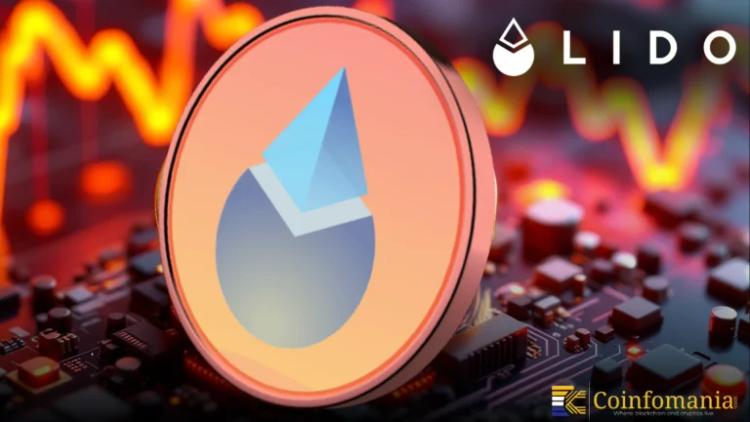LDO
As of February 24, 2026, Lido Dao (LDO) is trading at approximately 1.4 USD, reflecting a -6.34% decrease from the previous close.
| Current Price | 24h Price Change | 7-Day Avg Price | Support Level | Next Resistance |
| $1.40 USD | -6.34% | $0.842 USD | $0.554 USD | $3.71 USD |
📈 Technical Analysis Summary
- Price Movement: The -6.34% decrease indicates Bearish pressure; potential uncertainty or profit-taking.
- 7-Day Average Comparison: Trading above the 7-day average ($0.842 USD); reinforces bullish trend; market is gaining strength.
- Support and Resistance Levels: Price is above support ($0.554 USD); confirms bullish base. Room for growth before hitting resistance ($3.71 USD).
- RSI Analysis: RSI at 64.42 indicates Neutral zone; balanced market.
- MACD Analysis: Positive MACD (+0.02); suggests bullish momentum.
📊 Market Sentiment
| Indicator | Value | Interpretation |
|---|---|---|
| RSI | 64.42% | Neutral; neither overbought nor oversold |
| MACD | +0.02 | Bullish; suggests upward momentum |
| Above 7-Day Avg? | Yes | Indicates bullish momentum |
| Above Support? | Yes | Suggests price stability above support. |
Lido Dao Price Prediction Preview
| Forecast Range | Prediction Trend |
|---|---|
| Daily | 📈 Bullish — Bitcoin is expected to maintain upward momentum short-term |
| Weekly | 📊 Moderate Gain — Steady growth expected; strong support holding |
| Monthly | 🚀 Bullish — LDOUSD could test $1.09 if momentum sustains |
| Yearly | 🧯 Uncertain — Macro factors may limit long-term upside for LDOUSD |
Related News

Lido DAO Proposes Major LDO Buyback Plan Using Uniswap Liquidity Pools
A new proposal to initiate an automated buyback system of its governance token, LDO, was introduced in the Lido DAO community, as reported by @wublockchain12 on X at 11:51 UTC on November 11, 2025. The proposal proposes the implementation of LDO/wstETH liquidity in Uniswap-v2-like pools and control by an Aragon Agent to decrease the supply […]
Triparna Baishnab
Author

Arthur Hayes Wallet Adds $2M in LIDO, AAVE via Flowdesk
Shweta Chakrawarty
Author

Lido DAO Approves Dual Governance Model, Empowering $stETH Holders to Influence Protocol Decisions
Triparna Baishnab
Author

DeFiance Capital’s Massive $LDO Deposits Signal Potential Market Shift
Emmmaculate Araka
Author

Lido DAO Introduces the Ultimate Dual Governance for stETH Users
Archisha Mondal
Author
Lido DOA (LDO) serves as the voting token for Lido's liquid staking network. Lido launched in 2020 under the leadership of crypto pioneers Konstantin Lomashuk and Vasiliy Shapovalov. Their ERC-20 governance token gives holders real decision-making power from protocol improvements to fee adjustments and expansion plans.
The platform's game-changing innovation? Letting users stake ETH, SOL, and other assets while keeping them liquid via stETH tokens. As more investors embrace this solution, LDO's role as the project's governance engine becomes increasingly vital. Its 1.51B token supply is allocated between founders, investors, treasury, and community. With liquid staking becoming essential to DeFi, LDO serves both as a governance tool and value-accrual mechanism for one of crypto's most widely-used staking solutions.
How Lido DAO Functions
Lido DAO simplifies staking by pooling users’ funds and delegating them to validators. Here’s how it works:
- Users deposit ETH, SOL, or other supported PoS assets into Lido.
- Lido stakes these assets with professional node operators.
- Users receive liquid staking tokens (e.g., stETH for Ethereum) representing their stake.
- These tokens accrue staking rewards and can be traded or used in DeFi protocols.
Lido removes the traditional staking Lido, eliminates lock-up periods, providing liquidity while earning rewards.
Lido DAO and Other Cryptocurrencies
Lido DAO's LDO token stands out in decentralized liquid staking by working across multiple blockchains. While its stETH token leads Ethereum staking, the protocol also extends to other networks - offering stSOL for Solana and stMATIC for Polygon users.
What sets Lido apart from centralized alternatives is its community-driven governance model and robust liquidity pools, offering proof-of-stake participants flexible yield opportunities without capital lockup constraints. Its cross-chain ambitions position LDO as a bet on the broader staking economy.
Why This Matters for LDO:
- Multi-chain strategy diversifies revenue streams.
- stETH's DeFi dominance drives protocol fees.
- Governance token captures value across all supported chains.
Technology Behind Lido DAO
Lido’s technology is built on smart contracts and DAO governance:
- Smart Contracts: Automate staking, rewards distribution, and token issuance.
- Liquid Staking Tokens (LSTs): Enable trading and DeFi integration.
- Decentralized Governance: LDO holders vote on upgrades, fees, and new features.
- Node Operators: Professionally managed to ensure security and uptime.
The platform is fully non-custodial, meaning users retain control of their assets.
Is Investing in Lido DAO (LDO) in 2025 Still Profitable?
Lido DAO (LDO) is an attractive investment because it leads in liquid staking, especially for Ethereum. The token gains from the rise in Proof-of-Stake use offer passive income through staking rewards and connect well with DeFi using stETH. Still, investors should consider risks from regulations and growing competition in the staking field.
Legal Regulatory for Lido DAO
Lido DAO enters 2025 facing major regulatory uncertainty. U.S. regulators are poised to rule on whether staking constitutes security, potentially requiring Lido to overhaul its operations. Such a decision may dramatically reshape the platform's U.S. services. Staking rewards will likely remain taxable as income globally. While Lido's decentralized structure provides some resilience, regulators could demand stricter KYC/AML measures potentially impacting user anonymity and platform operations. The DAO's distributed governance may help navigate these hurdles.
Steps to Purchase Lido DAO (LDO)
LDO can be purchased on major exchanges:
- Centralized Options: Binance, Coinbase, and Kraken list LDO alongside major trading pairs.
- Decentralized Platforms: Swap LDO directly on Uniswap or SushiSwap.
- Popular Pairings: Trade against USDT, ETH, or BTC across most exchanges.
Steps to buy LDO:
- Create an account on a supported exchange.
- Deposit funds (fiat or crypto).
- Buy LDO via spot or limit orders.
- Store securely in a wallet.
Lido DAO Wallets and Security
Recommended wallets for storing LDO:
- Hardware Wallets: Ledger, Trezor (most secure).
- Software Wallets: MetaMask, Trust Wallet, Rabby Wallet.
- Exchange Wallets: Coinbase, OKX, Binance (for short-term holding).
- DeFi Wallets: Safe (Gnosis) Wallet, Frame Wallet (for active users).
Always enable 2FA and avoid sharing private keys.
How to Secure Your LDO Holdings?
Best security practices for LDO holders:
- Use a Hardware Wallet – Store LDO tokens in cold storage (Ledger, Trezor) for maximum security against hacks.
- Enable 2FA – Protect exchange accounts with two-factor authentication when holding LDO temporarily.
- Verify Smart Contracts – Only interact with Lido’s official staking contracts.
- Avoid Phishing Scams – Never enter your seed phrase on unofficial sites claiming to be Lido.
- Keep Software Updated – Ensure your wallet (MetaMask, etc.) and devices have the latest security patches.
Lido DAO Adoption and Use Cases
Lido’s adoption is growing due to:
- DeFi Partnerships: stETH is used in Aave, Curve, and Yearn Finance.
- Institutional Interest: Large investors prefer liquid staking.
- Cross-Chain Expansion: Supports multiple blockchains.
Use cases include staking rewards, yield farming, and collateral in lending protocols.
Lido DAO’s Future Vision and Expansion Potential
Three critical elements will shape Lido DAO's path forward. The most important is Ethereum's ongoing evolution - as the network grows and matures, we're seeing more ETH investors looking to put their holdings to work through staking. This natural progression plays directly to Lido's strengths, potentially driving substantial new demand for their liquid staking solutions. Adding support for other PoS blockchains could attract new investors. Clear staking regulations would help drive wider adoption. With crypto increasingly moving to Proof-of-Stake systems, Lido has become a staking leader, a position it's well-positioned to keep.
Pros and Cons of Investing in Lido DAO
Pros of Investing in Lido DAO (LDO):
- Offers liquid staking with no lock-up periods.
- Backed by Ethereum's growing Proof-of-Stake ecosystem.
- Governance token with voting rights in a leading DeFi protocol.
- Generates passive income through staking rewards.
- Widely integrated across major DeFi platforms.
Cons of Investing in Lido DAO (LDO):
- Faces regulatory uncertainty around staking services.
- Highly volatile like most crypto assets.
- Competes with other staking platforms.
- Smart contract risks despite audits.
- Value tied to Ethereum's performance
Conclusion
Lido DAO (LDO) provides the solution for liquid staking in crypto. Users earn staking rewards through Ethereum and other proof-of-stake networks without sacrificing liquidity that helps to boost LDO massively. Lido delivers exactly that, letting users stake their assets while keeping them available for trading or DeFi activities.
The LDO token gives holders a voice in governing this essential DeFi infrastructure, proving its worth beyond speculation. With a vibrant community, proven utility across multiple blockchains, and growing adoption it positions it as a key building block for decentralized finance's future.
Frequently Asked Questions
How does LDO’s tokenomics differ from other governance tokens?
LDO has a fixed supply (1 billion tokens), with no inflation, making it scarce. Unlike some governance tokens, it doesn’t directly generate yield but derives value from Lido’s staking fees and protocol growth.
Can LDO be staked for additional rewards?
No, LDO itself isn’t stakable it’s a governance token. However, holding it allows voting on fee structures and upgrades, which can indirectly boost its value as the protocol grows.
What happens to LDO if Ethereum’s staking demand declines?
LDO’s price could suffer, as Lido’s revenue relies heavily on ETH staking. However, its expansion to Solana, Polygon, and other chains mitigates this risk.
How does Lido’s DAO ensure decentralization?
LDO holders vote on key decisions (e.g., treasury spending, new integrations). No single entity controls the protocol, though large holders (whales) can influence votes.
Why does LDO’s price correlate with stETH adoption?
More stETH usage in DeFi (e.g., as collateral) increases Lido’s revenue, which benefits LDO holders. The token acts as a proxy for Lido’s success.
Is LDO at risk if regulators ban liquid staking?
Yes. A crackdown on staking (e.g., SEC classifying stETH as a security) could hurt demand for LDO, though its DAO structure may adapt faster than centralized rivals.
How does Lido’s revenue-sharing model impact LDO?
Lido earns fees from staking rewards, but these currently don’t flow to LDO holders. Future governance proposals could change this, potentially boosting LDO’s utility.
What competitive edge does LDO have over Rocket Pool’s RPL?
Lido’s first-mover advantage and deeper liquidity (via stETH) give LDO an edge, though RPL’s decentralized node network appeals to Ethereum purists.
Can LDO holders influence Ethereum’s staking ecosystem?
Indirectly—LDO governance votes can shape Lido’s validator strategies, affecting Ethereum’s decentralization. However, it doesn’t control Ethereum’s core protocol.
Why hasn’t LDO implemented a buyback/burn mechanism?
Unlike tokens with deflationary models (e.g., ETH post-EIP-1559), LDO’s value relies on governance utility. Buybacks are unlikely unless the DAO votes to redistribute fees.